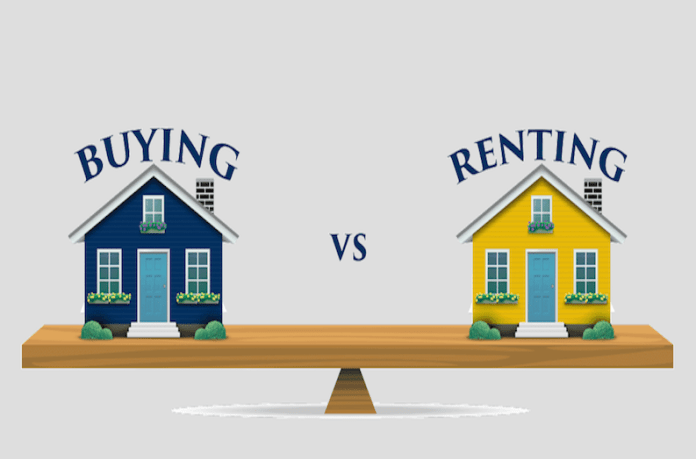Stock Market
'Tuesday' start in the stock market, Sensex jumped 300 points, Nifty crossed 25,900

Buying a home versus renting is one of the most significant decisions individuals face in their lives. Both options come with their own set of merits and demerits, and the right choice depends on various factors such as personal finances, lifestyle preferences, and long-term goals. Let's delve deeper into the advantages of each option to help you make an informed decision.
Advantages of Renting
No Maintenance Costs: One of the primary advantages of renting is the absence of maintenance costs or repair bills. Landlords or property owners are responsible for all maintenance tasks, including repairs to plumbing, roofing, or windows damaged by natural elements. Tenants can enjoy a hassle-free living experience without worrying about additional expenses.
Access to Amenities: Rental properties often come with access to amenities such as swimming pools, gyms, or recreational facilities, which would be costly to install and maintain in a homeowner scenario. Renters can enjoy these perks without bearing the financial burden, making it a cost-effective option.
Tenure Security: Renters have the security of tenure outlined in their lease agreements. As long as they adhere to the terms of the agreement, they can stay in the property without fear of sudden eviction or changes in ownership.
Fixed Rent Costs: Rent costs are typically fixed for the duration of the tenancy agreement. Landlords cannot arbitrarily increase rent during this period unless specified otherwise in the agreement, providing renters with financial predictability and stability.
Advantages of Buying Property
Personal Control: Homeownership grants individuals the freedom to make changes and upgrades to their property according to their preferences and needs. From remodeling the kitchen to landscaping the backyard, homeowners have full control over customization.
Predictable Monthly Payments: Unlike renting, where landlords can increase rent at the end of each lease term, homeowners benefit from fixed mortgage payments over an extended period, often up to 30 years. This stability in monthly housing costs offers financial security and long-term planning benefits.
Freedom to Make Changes: Homeowners have the liberty to modify their property without seeking permission from landlords. Whether it's painting the walls, installing built-in shelves, or renovating bathrooms, homeowners can personalize their space to reflect their style and preferences.
Frequently Asked Questions (FAQs)
1. Is renting always more affordable than buying?
While renting may seem more affordable in the short term due to lower upfront costs and absence of maintenance expenses, the long-term financial implications vary depending on factors such as location, market conditions, and individual circumstances. It's essential to consider both short-term affordability and long-term investment potential when making a decision.
2. What are the advantages of homeownership in terms of investment?
Homeownership can serve as a valuable investment, offering potential appreciation in property value over time. Additionally, homeowners can build equity through mortgage payments, which can be leveraged for future investments or financial security during retirement.
3. How does renting provide flexibility compared to buying?
Renting offers flexibility in terms of mobility and commitment. Tenants can easily relocate to different areas or upgrade to larger spaces without the constraints of selling a property. Additionally, renting allows individuals to test different neighborhoods or living arrangements before committing to homeownership.
4. Are there any downsides to renting in terms of long-term stability?
While renting provides immediate flexibility, long-term renters may face challenges such as rent increases, changes in property ownership, or limited control over living conditions. Renters should weigh the benefits of flexibility against the potential for instability in the long run.
he decision between renting and buying depends on various factors, including financial considerations, lifestyle preferences, and long-term goals. Both options offer unique advantages and drawbacks, and individuals must evaluate their priorities to make the right housing choice for their circumstances. Whether it's the convenience of renting or the investment potential of homeownership, understanding the pros and cons is crucial in making an informed decision.
'Tuesday' start in the stock market, Sensex jumped 300 points, Nifty crossed 25,900

